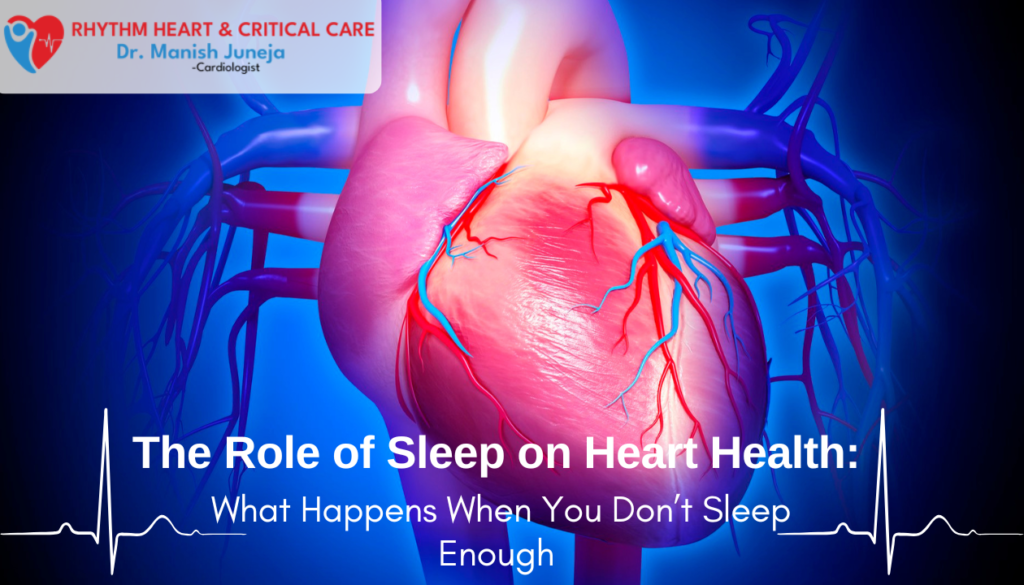Getting enough sleep is not just about feeling refreshed in the morning, but also plays a vital role in protecting your heart. Consistently sleeping less than required causes stress on the body, increasing the risk of high blood pressure, heart disease, cholesterol imbalance, and even stroke.
Understanding The Role of Sleep on Heart Health: What Happens When You Don’t Sleep Enough can help you take control of your long-term well-being.
As a cardiologist, I often see patients who ignore their sleep habits, not realizing how deeply sleep affects heart function, blood circulation, and overall cardiovascular strength.

Why Sleep Is Essential for a Healthy Heart
Your heart works 24/7, but it needs sleep to recover and function smoothly. During deep sleep, your heart rate slows down, blood pressure drops, and the cardiovascular system relaxes.
This resting time is vital for preventing long-term strain. When sleep is compromised, your heart has to work harder, leading to inflammation, hormonal imbalance, and increased stress on blood vessels.
The Role of Sleep on Heart Health: Lack of sufficient sleep is directly linked to the increasing cases of hypertension, obesity, and cholesterol problems, particularly among young adults. Poor sleep can silently weaken the heart without showing early symptoms.
10 Key Ways Poor Sleep Affects Your Heart Health
1. Increased Blood Pressure
When you don’t get enough sleep, your body stays stressed, which makes hormones like cortisol go up. This keeps your blood pressure high even when you’re resting, which can harm your heart over time.
High blood pressure makes arteries stiff, lowers blood flow, and makes the heart work harder. Over many years, this raises the chance of having a heart attack, stroke, or congestive heart failure. Good sleep helps your heart and blood vessels relax and reset naturally.
2. Higher Risk of Heart Disease
When you sleep, your heart and blood vessels slow down and get some rest. If you don’t get enough sleep regularly, your body can become inflamed inside the arteries, which makes it easier for harmful plaque to build up.
Not getting enough sleep also messes up your heart’s normal rhythm and puts more stress on your blood vessels. Over time, these changes can lead to serious heart problems like coronary artery disease.
Even missing a little sleep here and there can affect your arteries, but sleeping too little over a long period greatly increases the risk of heart disease for people of all ages.
3. Disruption of Body Hormones
Sleep helps keep hormones in balance, especially those that control stress and heart health. If you don’t get enough sleep, your body makes more cortisol and adrenaline, which keeps you in a state of being ready to fight or run.
This causes your heart to beat faster, your blood vessels to tighten, and puts more strain on your heart. Over time, this hormonal imbalance can lead to high blood pressure, an irregular heartbeat, and higher cholesterol.
Getting enough sleep is important for keeping hormones steady, which helps protect your heart in the long run.
4. Increased Inflammation in the Body
Not getting enough sleep causes inflammation in the body, especially in the blood vessels. This inflammation hurts the inside of the arteries, making them more likely to get blocked, become stiff, or have plaque form.
Inflammation is one of the first signs that heart disease might be developing. If not enough sleep keeps happening, the body’s inflammation stays active for a long time, which weakens the heart and blood vessels and makes it harder for tissues to get enough oxygen.
Good sleep helps reduce inflammation and keeps blood flow healthy.
5. Higher Blood Sugar Levels
Poor sleep directly disrupts insulin sensitivity, reducing the body’s ability to regulate blood sugar levels. As glucose levels increase, blood vessels get damaged, leading to plaque formation and a higher risk of heart complications related to diabetes.
High blood sugar also makes blood thicker and decreases oxygen flow, causing the heart to work harder.
Long-term sleep deprivation is a major risk factor for Type 2 diabetes, which in turn doubles the risk of heart disease. Adequate sleep helps stabilize sugar metabolism naturally.
6. Greater Chance of Weight Gain
Lack of sleep affects appetite-regulating hormones such as ghrelin (hunger hormone) and leptin (satiety hormone).
This imbalance increases cravings for high-calorie, sugary, and fatty foods. Poor sleep also reduces metabolism and energy levels, leading to lower physical activity throughout the day.
As weight increases, so does the strain on the heart, raising blood pressure and cholesterol levels. Even a small amount of weight gain from sleep deprivation can significantly impact heart health over time.
7. Reduced Ability to Handle Stress
Sleep plays a major role in emotional and physical stress control. When you’re sleep deprived, your sympathetic nervous system stays active, keeping your body in stress mode round the clock.
This causes faster heart rate, increased tension in arteries, and higher blood pressure. Chronic stress weakens heart muscles and increases the likelihood of arrhythmias and heart failure.
Good sleep supports emotional stability and gives your heart the downtime it needs to recover from daily stress.
8. Poor Oxygen Flow During Sleep
Sleep disorders such as sleep apnea make it harder for the body to get enough oxygen. When breathing stops repeatedly during sleep, the heart has to work harder to keep supplying oxygen to the body.
Over time, this can cause the heart muscles to become thick and weak, lead to an irregular heartbeat, and increase blood pressure. Not getting enough oxygen can also cause inflammation, which is bad for the arteries.
If left without treatment, sleep apnea can result in serious heart problems. Getting enough restful sleep helps oxygen flow smoothly and supports better heart health.
9. Increased Risk of Stroke
When sleep is disturbed, blood pressure rises and blood vessel flexibility decreases, both major risk factors for stroke. Poor sleep affects the brain’s blood flow, making arteries more prone to clots and blockages.
Chronic sleep deprivation also increases inflammation and affects the body’s ability to maintain stable blood sugar and blood pressure.
These factors significantly raise the likelihood of stroke. Quality sleep helps maintain healthy artery function and reduces the risk of sudden cardiovascular events.
10. Weakened Immunity Affects Heart Recovery
When you’re deeply asleep, your body works to fix damaged tissues, like those in your heart and blood vessels. If you don’t get enough sleep, this fixing process doesn’t happen fully, which makes it harder for your body to recover from swelling and stress on the heart.
A weaker immune system also makes you more likely to get sick, and these illnesses can have a hidden effect on your heart.
As time goes on, not getting enough sleep makes your body less able to fight off problems and heal itself, which can make long-term heart issues worse. Getting enough rest helps your immune system and supports the healing of your heart.
How to Improve Your Sleep for Better Heart Health
Improving your sleep is one of the easiest ways to take care of your heart. Try to get 7 to 8 hours of sleep each night without interruptions.
Avoid using phones or tablets too late at night, eating big meals, and drinking coffee or tea close to bedtime. If you have loud breathing while sleeping or feel tired even after a full night’s rest, it might be sleep apnea, a condition that can harm your heart.
As a trusted cardiologist in nagpur for heart treatment I work with patients to design personalized plans for heart health and better sleep that help them stay healthy for a long time.
Conclusion
Your heart depends on your sleep more than you realize. Small improvements in your sleep habits can significantly reduce your risk of heart disease, high blood pressure, and cholesterol problems.
If you’ve been experiencing fatigue, stress, poor sleep, or symptoms of heart issues, don’t wait.
Book your heart check-up today at drmanishjuneja.com and take the first step toward a healthier, stronger heart.
FAQ’s
1. How does lack of sleep affect heart health?
Lack of sleep increases stress hormones, raises blood pressure, and inflames arteries, all of which raise the risk of heart disease.
2. Can poor sleep increase blood pressure?
Yes. When you don’t sleep enough, your body stays in stress mode, causing consistently high blood pressure throughout the day.
3. Does sleep affect cholesterol levels?
Poor sleep can increase LDL (bad cholesterol) and decrease HDL (good cholesterol), contributing to plaque buildup in arteries.
4. Is sleep linked to heart attacks?
Yes. Chronic sleep deprivation increases inflammation and stiffens arteries, raising the long-term risk of heart attacks.
5. Can lack of sleep cause weight gain that affects the heart?
Absolutely. Poor sleep disrupts hunger hormones, causing overeating and weight gain—major risk factors for heart disease.
6. How does sleep impact blood sugar levels?
Insufficient sleep affects insulin function, raising blood sugar levels and increasing the risk of Type 2 diabetes.
7. Does stress from poor sleep harm the heart?
Yes. Sleep deprivation keeps your nervous system activated, raising stress levels that strain the heart over time.
8. What is the connection between sleep apnea and heart issues?
Sleep apnea reduces oxygen during sleep, making the heart work harder and increasing the risk of heart failure and arrhythmias.
9. Can poor sleep increase stroke risk?
Yes. Poor sleep affects blood vessel health, blood flow, and inflammation, all of which raise the risk of stroke.
10. How much sleep is ideal for a healthy heart?
Most adults need 7–9 hours of quality sleep per night to maintain optimal heart function and overall well-being.
Reference:
https://www.cdc.gov/heart-disease/about/sleep-and-heart-health.html
https://www.cdc.gov/heart-disease/about/sleep-and-heart-health.html

